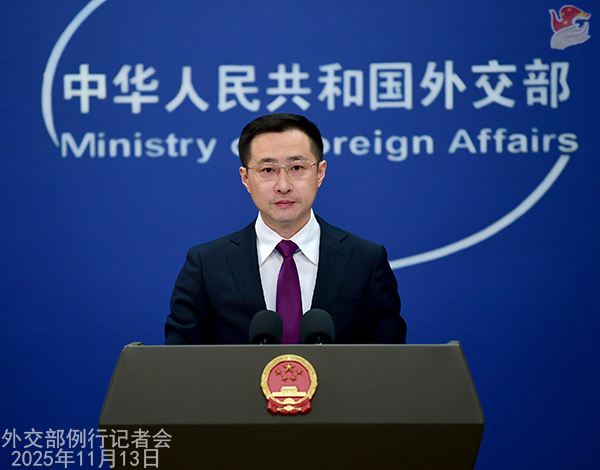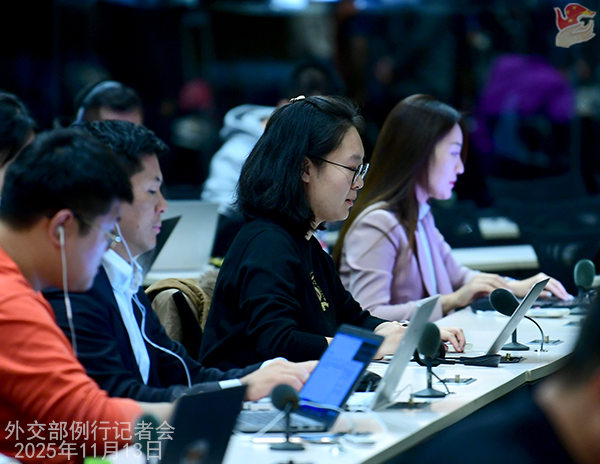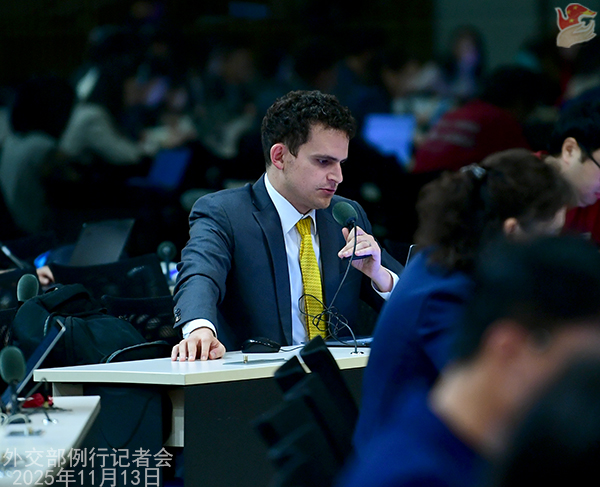
People’s Republic of China


At the invitation of Russian Prime Minister Mikhail Mishustin, Premier of the State Council Li Qiang will attend the 24th Meeting of the Council of Heads of Government of Member States of the Shanghai Cooperation Organization in Moscow on November 17 and 18.
At the invitation of the government of the Republic of Zambia, Premier of the State Council Li Qiang will pay an official visit to Zambia on November 19 and 20.
At the invitation of the government of the Republic of South Africa, Premier of the State Council Li Qiang will attend the 20th G20 Summit in Johannesburg from November 21 to 23.
CRI: You just announced that Premier Li Qiang will attend the 24th Meeting of the Council of Heads of Government of Member States of the Shanghai Cooperation Organization (SCO). How do you view the current development of the SCO? What’s your expectation of this meeting?
Lin Jian: The SCO Tianjin Summit was held successfully this fall. Leaders of SCO member states achieved a series of important common understandings on upholding the Shanghai Spirit and promoting the development and reform of the SCO, leading the SCO into a new stage of high-quality development featuring greater solidarity, coordination, dynamism and productiveness. President Xi Jinping put forward the Global Governance Initiative (GGI) which was welcomed and supported by parties attending the Summit and widely recognized by the international community.
At this meeting of the Council of Heads of Government, Premier Li Qiang will have an in-depth exchange of view with all parties on implementing the outcomes of the SCO Tianjin Summit, strengthening solidarity and coordination in the SCO, and deepening regional economic and cultural cooperation. China believes that this meeting will sustain the positive momentum of the SCO Tianjin Summit, promote the implementation of the development strategy for the SCO in the next 10 years, better safeguard the common interests of member states, and inject more positive energy into regional and world peace, stability, development and prosperity.
Xinhua News Agency: To follow up on your announcement that Premier Li Qiang will attend the 20th G20 Summit. Can you share China’s expectation for the summit?
Lin Jian: Amid rapid changes in the world not seen in a century, sluggish global economic growth and widening development deficit in the world, the G20, as the premier forum for international economic cooperation, needs to enhance solidarity and cooperation, jointly respond to challenges, improve global economic governance and contribute to world economic growth and the development and prosperity of countries. It is of historic significance that the G20 summit is held on the African continent for the first time. China supports South Africa’s G20 presidency and stands ready to work with various parties under the theme “Solidarity, Equality, Sustainability” to build up consensus at the summit for upholding multilateralism, building an open world economy and promoting the cooperation on development.
People’s Daily: Japanese Prime Minister Sanae Takaichi said last week that the mainland’s use of force on Taiwan could constitute a “survival-threatening situation” for Japan. It’s reported that during Diet deliberations, Sanae Takaichi said her remark is in line with the government’s position and she will not retract it. What’s China’s comment?
Lin Jian: In the Diet last week, Japanese Prime Minister Sanae Takaichi made provocative remarks on Taiwan which imply the possibility of armed intervention in the Taiwan Strait. Despite China’s serious démarches and protests, she still refused to change course and take back what she had said. The wrongful remarks grossly violate the one-China principle, the guiding principles set forth in the four China-Japan political documents, and the basic norms of international relations. That constitutes a blatant interference in China’s internal affairs, a challenge to China’s core interests, and infringement on China’s sovereignty. China firmly opposes and will by no means tolerate such remarks. The Japanese side must correct its wrongdoing at once and retract the unjustified remarks. Otherwise, all the consequences arising therefrom must be borne by the Japanese side.
This year marks the 80th anniversary of the victory of the Chinese People’s War of Resistance Against Japanese Aggression and the World Anti-Fascist War. It is also the 80th anniversary of the recovery of Taiwan. Japan committed innumerable crimes during its colonial rule in Taiwan. Over the last century, Japanese militarists have waged aggression more than once under the pretext of “survival-threatening situation.” For example, Japan brazenly created the September 18th Incident under the pretext of exercising the right of self-defense. Its aggression against China inflicted untold suffering on the people of China, the rest of Asia, and the wider world. What’s Prime Minister Sanae Takaichi up to by reviving the phrase “survival-threatening situation”? Is Japan going to repeat its past mistakes of militarism? Does Japan try to once again make enemy with the Chinese and other Asian people? Does Japan attempt to subvert the post-WWII international order?
Taiwan belongs to China. How to resolve the Taiwan question and realize national reunification is a matter for the Chinese people to decide and brooks no interference by any external force. The attempt by the leader of Japan to wade into cross-Strait affairs is a serious affront to international justice, a blatant provocation to the post-WWII order, and a great blow to China-Japan relations. If Japan dares to attempt an armed intervention in the cross-Strait situation, it would be an act of aggression and definitely meet a firm response from China. We will firmly exercise our right to self-defense under the U.N. Charter and international law and defend China’s sovereignty and territorial integrity. Our message to Japan is clear: Japan must fully repent for its war crimes, immediately stop its wrong and provocative statements and moves that interfere in China’s internal affairs, and stop playing with fire on the Taiwan question. Those who play with fire will perish by it!

Shenzhen TV: It’s reported that on November 10, Thai soldiers were injured by a landmine explosion in Thailand-Cambodia border. On November 11, Thailand’s National Security Council held an emergency meeting and announced that it would suspend the implementation of the joint declaration on border peace between Thailand and Cambodia. On the afternoon of November 12, Thai soldiers opened fire in Banteay Meanchey Province, Cambodia, and caused Cambodian civilian casualties. What’s China’s comment?
Lin Jian: China noted some new developments and issues during the implementation of the joint declaration between Thailand and Cambodia. As the friend and close neighbor of the two countries, China sincerely hopes that both sides can exercise restraint, work in the same direction, carry out friendly consultation, give play to existing bilateral mechanisms, and find a solution that is acceptable to both sides as soon as possible and prevent any escalation. China will continue to play a constructive role in promoting deescalation in our own way.
EFE: During the state visit of King Felipe VI of Spain to China, the two heads of state had a meeting and reached several common understandings. How does China view this visit and the future development of China-Spain relations and high-level exchanges?
Lin Jian: As the two countries celebrate the 20th anniversary of the comprehensive strategic partnership, King Felipe VI of Spain paid a state visit to China. President Xi Jinping and King Felipe VI had a meeting and reached several common understandings, injecting strong impetus into the development of China-Spain relations. Premier Li Qiang and Chairman of the NPC Standing Committee Zhao Leji also met with King Felipe VI respectively.
The two heads of state agreed to carry forward traditional friendship, consolidate political mutual trust, and firmly support each other’s core interests and major concerns. Spain is firmly committed to the one-China policy and willing to continue to be China’s reliable partner. The two countries always respect each other, treat each other as equals, and jointly advance the comprehensive strategic partnership to bring more benefits to the two peoples and contribute even more to global peace and stability.
The two heads of state agreed to deepen practical cooperation and people-to-people and cultural exchanges, and forge a comprehensive strategic partnership with greater strategic determination, dynamism and global influence. In the past 20 years, China and Spain have had ever-closer cooperation. The bilateral trade volume has nearly quadrupled, demonstrating the strong internal driving force for bilateral ties. Both sides agreed that it is important to align development strategies, expand trade, investment and sci-tech cooperation, tap into the potential of cooperation in emerging fields including new energy, digital economy and artificial intelligence, facilitate people-to-people exchanges, and add more highlights and new drivers to practical cooperation. During this visit, the two sides signed 10 cooperation documents in trade and economy, science and technology, and education, among others.
The two heads of state agreed that China and Spain share similar position on many international affairs, and both support multilateralism, the settlement of disputes through dialogue and consultation, and the central role of the UN in the international system. Spain highly appreciates the Global Development Initiative, the Global Security Initiative, the Global Civilization Initiative, and the Global Governance Initiative put forward by President Xi Jinping, and is going to have closer multilateral coordination with China, jointly uphold international trade order, promote the steady development of the global economy, and respond to uncertainties in the international landscape.

Reuters: The Beijing High Court this morning rejected an appeal by a jailed journalists Dong Yuyu to overturn a seven-year jail term for espionage. There has been foreign and family criticism that the legal proceedings are unjust. What is the Ministry’s response to this? (A similar question was asked by NHK)
Lin Jian: We have responded to that before. Let me stress that China upholds the rule of law, Chinese judicial authorities handle cases in strict accordance with the law, and those who violate the law will surely be held accountable in accordance with the law.
CCTV: In response to a question from Japanese media on November 12 regarding Sanae Takaichi’s remarks on “Taiwan contingency,” the U.S. State Department spokesperson said that the U.S. is committed to preserving peace and stability in the Taiwan Strait and opposes any unilateral changes to the status quo. The U.S. supports cross-Strait dialogue, and hopes that differences will be resolved by peaceful means, free from coercion, in a manner acceptable to the people on both sides of the Strait. What is China’s comment?
Lin Jian: On Sanae Takaichi’s wrong remarks, China has stated its solemn position. Let me reiterate that the Taiwan question is at the core of China’s core interests and the first red line that must not be crossed in China-U.S. relations. How to resolve the Taiwan question is a matter for the Chinese ourselves and brooks no external interference. We urge the U.S. to abide by the one-China principle and the three China-U.S. joint communiqués, stop abetting and supporting “Taiwan independence” separatist forces, and stop harming China-U.S. relations and peace and stability in the Taiwan Strait.
China News Service: To follow up on your announcement that Premier Li Qiang will pay an official visit to Zambia. How does China view its relations with Zambia and what is China’s expectation for the visit?
Lin Jian: Zambia is a comprehensive strategic cooperative partner of China in Africa. Over the past 61 years of diplomatic relations, the two countries have developed bilateral ties under the principles of mutual respect, equality and mutual benefit, and the traditional friendship has grown stronger over time. In recent years, under the care and strategic guidance of President Xi Jinping and President Hakainde Hichilema, the bilateral relations have maintained robust development with solid mutual trust and fruitful cooperation outcomes in various areas.
China looks to working with Zambia through the visit to accelerate the implementation of the important common understandings between the two presidents and the outcomes of the FOCAC Beijing Summit, deepen political mutual trust, expand mutually-beneficial cooperation, promote common development, have closer communication and coordination on international and regional affairs, and make greater contribution to building an all-weather China-Africa community with a shared future for the new era.
AFP: The number one ranked Indian tennis player Sumit Nagal said on social media this week that he was denied a Chinese visa which he needs to compete at the Australian Open Wildcard Play-off in Chengdu. Does China’s Foreign Ministry have any comment on Mr. Nagal’s visa denial?
Lin Jian: China will issue visas in accordance with laws and regulations for athletes from all countries, including India, who are going to compete in China. We hope that relevant personnel will submit their applications on time and in line with the requirements set by the Chinese Embassy in India.
RIA Novosti: The G7 foreign ministers yesterday expressed their remaining concerns regarding China’s military build-up and rapid increase of nuclear weapons arsenal. They urged Beijing to demonstrate its commitment to stability. I wonder what’s China’s comment on this statement?
Lin Jian: With regard to the joint statement of G7 Foreign Ministers’ Meeting that you mentioned, let me stress that the joint statement once again represents a mischaracterization of facts, a deliberate vilification of China, and a gross interference in China’s internal affairs. China deplores and opposes that.
The Taiwan question is purely China’s internal affair. How to resolve the Taiwan question is a matter for the Chinese people, which tolerates no external interference. The situation in the East China Sea and the South China Sea is generally stable. The G7 should stop using maritime issues to stoke disputes, escalate tensions and undermine regional peace and stability. China has always been aboveboard on the Ukraine crisis. China has never provided lethal weapons to any party to the conflict and strictly controls the export of dual-use articles. We never accept the G7’s blame-shifting or groundless accusation.
With regard to peace and security, China is the major country with the best track record. China is firmly committed to peaceful development and a national defense policy that is defensive in nature. China always keeps its nuclear strength at the minimum level required by national security. The G7 turns a blind eye to the U.S.’s special and primary nuclear disarmament responsibility and the nuclear proliferation risks from AUKUS while directing the issue at China. This is a typical move of confusing right with wrong.
China’s measures to standardize and refine its export control system comply with international common practices and aim to better defend world peace and regional stability and to fulfill its international obligations. The so-called “China’s overcapacity” and “non-market practices” have been proven false by facts and have no merits at all. The G7 should stop politicizing and weaponizing trade issues to refrain from disrupting international economic order and global industrial and supply chains.
China once again urges the G7 to take a clear grasp of the global trend, abandon the Cold War mentality and ideological bias, stop manipulating issues related to China, stop interfering in China’s internal affairs, and make more contributions to solidarity and cooperation in the international community.



